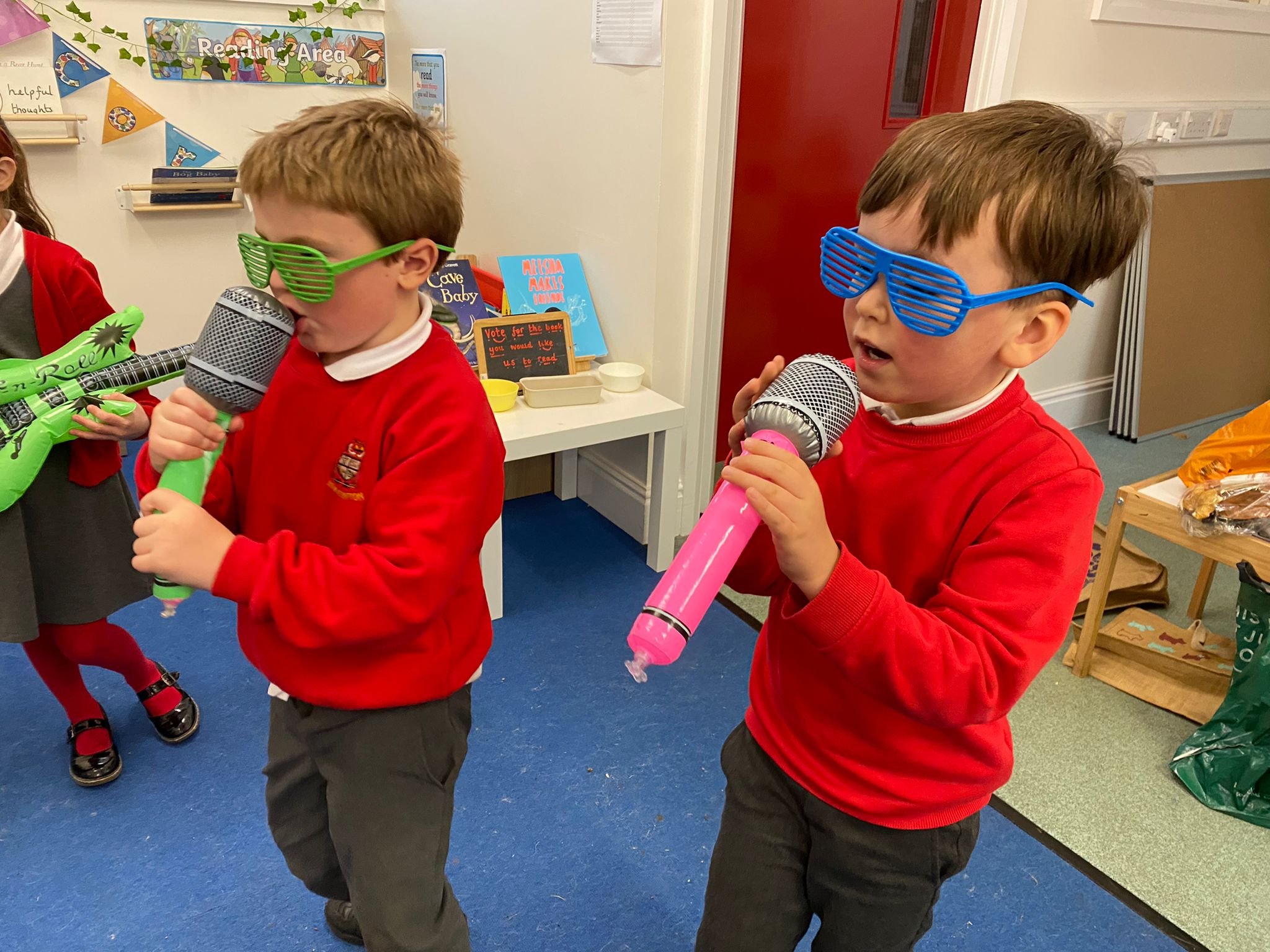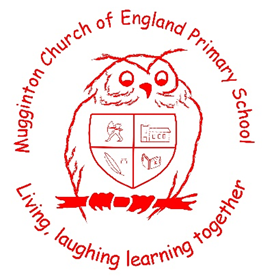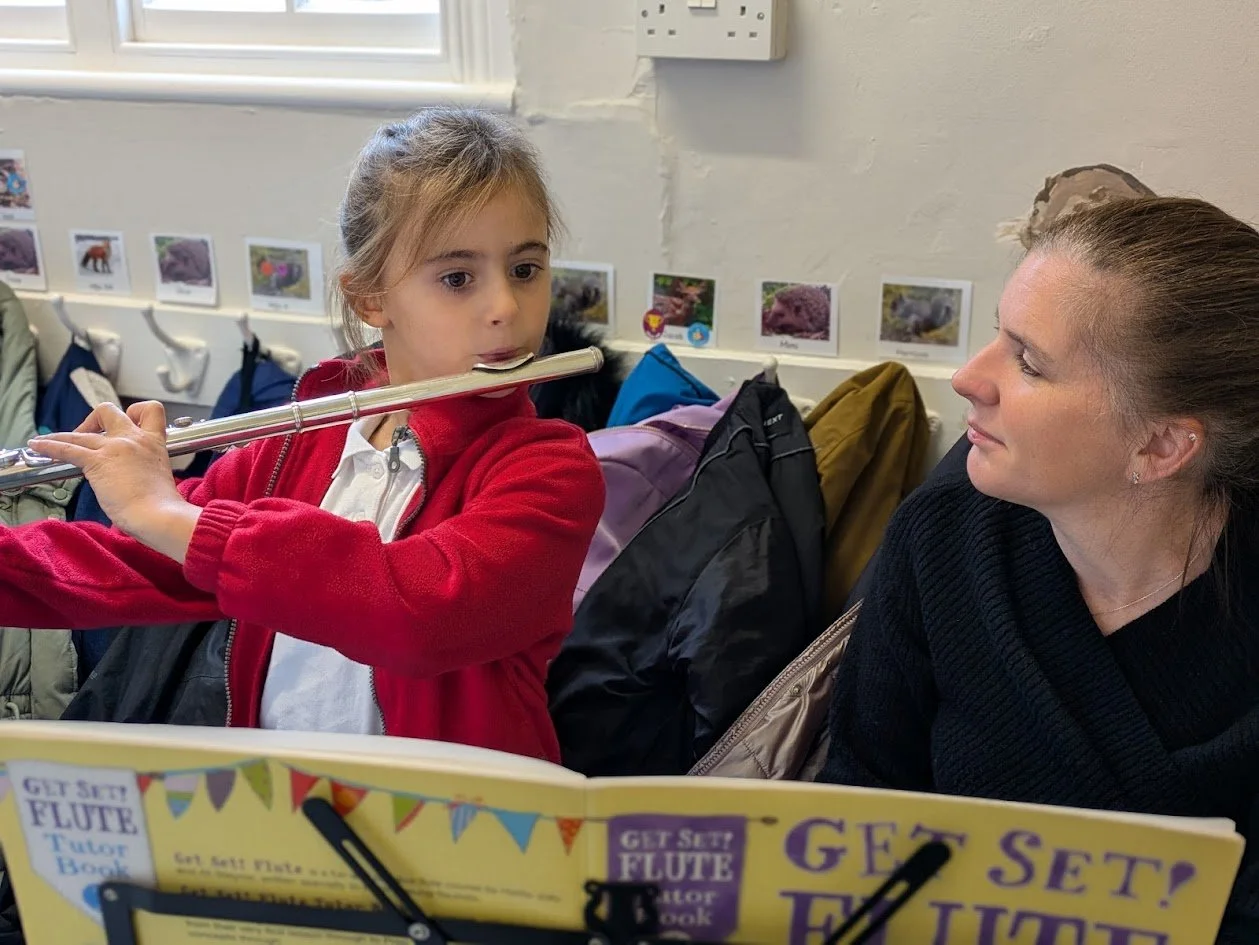
music at mugginton
‘The music department is an alternate universe where pupils are often unrecognisable from who they are outside of it. The shy become confident. The agitated become calm. The lonely become included. The quiet become heard. And the lost become found. Music reveals the real child.’
Music is a huge part of life at Mugginton and is a defining feature of British culture from classical composers like Elgar and Purcell to modern influences from the likes of The Beatles and Sam Cooke. A child’s musical capital begins from the moment a child first sings in collective worship; sings in a choir or plays their first note on an instrument. At Mugginton, we believe that experiencing and enjoying a range of musical opportunities should be an integral part of primary school and of childhood in general.
We want to share with our children the joy which music can bring and have seen the transformational effect which music has on children. Our staff recall with great affection the school shows they took part in and the musical instrument exams they succeeded in – we see how these experiences can shape our personalities and increase confidence. We work hard to keep up-to-date with the latest research and the Ofsted Research Review on Music and the government’s 2022 National Plan for Music Education documents are at the heart of our music planning.
Music at our school
At Mugginton, we always aim for a high-quality music education curriculum which inspires all to perform, listen to, review and evaluate music from across the world. We support the National Plan for Music’s (Chaired by Darren Henley – CEO of the Arts Council) assertion that music should be given a higher status in every primary school’s curriculum. Music is creative, collaborative, celebratory and challenging. At Mugginton we aim for music to bring our school community together through whole-school singing, ensemble playing, experimenting with the creative process and through love of listening to friends and classmates performing.
Our music planning is underpinned by the following values:
1) Music is an integral part of our culture and identity – not something ‘bolted on’ to the curriculum.
2) Music is a contributor to children’s holistic development – it helps children develop physically, socially, intellectually and mentally (McCarthy, O’Flaherty and Downey 2019).
3) We have a duty to help children experience the joy and confidence that music brings to one’s life.
4) Every child will have the opportunity to play a range of musical instruments, learn to read music and appreciate music from around the world.
5) Opportunities to take part in school shows, half-termly school concerts at the church and individual music lessons with our music specialist, Corrina, help to build confidence and pride.
6) Children need to see adults valuing music. Whether this is Mrs Dennis leading whole school singing; Mr Green and Mr Wraith learning to recognise different musical instruments; Mrs Sweeney and Miss Beresford practising songs for school plays or Corrina teaching music lessons, we play a central role in encouraging everybody to get involved and try their best.
Our children participate in regular class music lessons and perform half-termly at our Church Concerts/Services. Over 75% of our children have individual instrument lessons with Corrina, who offers clarinet, flute, saxophone, piano and more!
Why Mugginton places such value on music
Music is highly personal, creative is as a unique form of communication that can change the way children feel, think and act. It gives children the chance to express their personalities in different ways (DfE 2010). There is a significant body of evidence that music helps children to develop all kinds of skills such as fine and gross motor skills and capabilities in other subjects such as maths and reading (Daubney 2019). Music has been shown to be key in children’s personal development. By making music together, children’s teamwork skills are developed as well as their confidence to speak and perform (Atkinson 2018). Ofsted say that children’s involvement in music engages pupils, increases their self-esteem, and maximises their progress in education across many subjects. Most importantly, our children tell us they love music and love sharing their creativity with their friends and family.
What do children gain from music?
Many studies (e.g. Fernandez 2018) have demonstrated that music education benefits a child's overall mental development. NAMM (2016) reported that musical training physically develops the left side of the brain, known to be involved with processing language and reasoning supporting the idea that music teaching also benefits learning in English and maths. In addition, knowledge of great composers, famous musicians and singers is a part of the Cultural Capital all children need as they enter adulthood in Britain.
Understanding musical language or learning to play an instrument is challenging at times. Those who learn music also learn to be disciplined and resilient because that is the key to success. By ‘living’ the fact that practice and hard work is essential to reach their goals, children will learn a very valuable life lesson – we never give up!
The Soft Skills which Matter
Music is a great stress-relieving tool that helps to calm the mind and enhance concentration for children. It can also help children to manage their feelings better by expressing emotion through the instrument they are playing, the song they are singing or when composing their own music. By improving their instrument-playing, children feel a sense of personal pride, and this greatly improves their self-esteem. Taking risks and facing challenges is essential for a child to fully develop their potential.
In group musical activities children attend rehearsals and practise together, which leads to the children developing a sense of belonging and pride when a concert or show goes well. This is a special memory they will carry with them for their whole lives.
However, above everything else children gain from music, it is something that is really fun! Once the children have grasped the basics of playing an instrument, they are likely to enjoy playing it. Every song they learn is a personal achievement and treated as such. By encouraging and celebrating every child, they have a great time playing their musical instrument and feel like their talents and achievements are valued.
Music was a huge casualty of the coronavirus pandemic, with children’s musical activity significantly limited by the prohibition of singing and playing instruments. We believe, therefore that it is even more important for music provision and delivery to be effective to try and bridge this educational deficit.
music policy
Music Plan 2025-2026
iNSTRUMENT lESSONS

Designated Safeguarding Lead
Mr J Green
Designated Safeguarding Lead: 1st cover
Monday, Tuesday: Mrs D Wallen; Wednesday - Friday: Mrs E Dennis
Designated Link Governor for Safeguarding
Mrs C Stroud
SENCO
Mrs E Dennis













